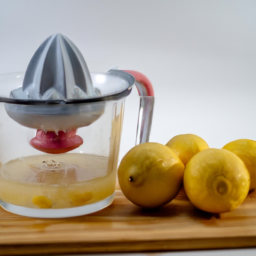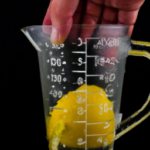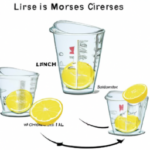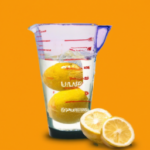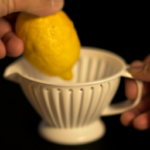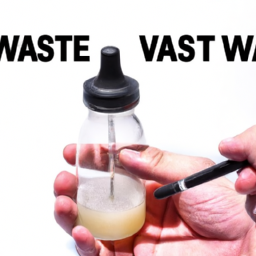Have you ever been in the middle of cooking or baking and suddenly realized you needed lemon juice, but weren’t sure how much to add? Don’t worry, I’m here to help you demystify the process of measuring lemon juice.
It may seem like a trivial matter, but getting the right amount of lemon juice can make all the difference in the taste and texture of your dish.
When it comes to cooking and baking, precision is key. As someone who has had their fair share of recipe mishaps, I can attest to the fact that even the smallest measurement can make or break a dish. That’s why it’s important to know exactly how much juice you can expect from one lemon, and how to extract it efficiently.
So, let’s dive into the world of lemon juice measurement and ensure that your next dish is a success.
Key Takeaways
- Knowing how much juice is in one lemon is important for achieving the right taste and texture in dishes.
- Factors such as ripeness, temperature, and variety of lemon can affect juiciness.
- Efficient tools for extracting juice include lemon squeezers, forks, tongs, and rolling the lemon on a hard surface and using a spoon.
- On average, one lemon yields around 2-3 tablespoons of juice, which can be used in many recipes and has numerous health benefits.
The Importance of Knowing How Much Juice is in One Lemon
Knowing how much juice is in one lemon is key if you want your recipes to pack a punch of flavor! As a professional chef, I know the importance of using the right amount of ingredients in recipes to achieve the perfect balance of flavors.
The juice of a lemon is a common ingredient in many dishes like sauces, marinades, dressings, and desserts. It adds a tangy, refreshing, and acidic taste that can make all the difference in a recipe. By knowing how much juice is in one lemon, you can avoid using too little or too much, which can affect the taste and texture of your dish.
The usage of lemon juice varies depending on the recipe. Some recipes only require a small amount, while others need a large quantity. For example, a simple vinaigrette dressing may only need a teaspoon of lemon juice, while a lemon meringue pie could require the juice of six lemons or more. By knowing how much juice is in one lemon, you can adjust the recipe accordingly and avoid wasting ingredients.
It’s essential to have accurate measurements to ensure your dishes turn out delicious every time. Now, let’s explore the factors that affect the amount of juice in a lemon.
Factors That Affect the Amount of Juice in a Lemon
You might be surprised to learn that the amount of juice you can extract from a lemon is not solely determined by its size. There are several factors affecting juiciness, such as the ripeness and temperature of the fruit.
A fully ripe lemon is typically juicier than an unripe one, which might have a thicker skin and less liquid inside. Furthermore, if the lemon is too cold, it can be harder to extract the juice, as the cells containing the liquid are less likely to break open. On the other hand, a warm lemon can release more juice, but it can also become too soft and mushy, making it harder to handle.
In addition to these factors, the variety of lemon can also play a role in the amount of juice you can extract. Some lemon varieties have thinner skins and more juice sacs than others, making them more suitable for juicing. For example, Eureka and Lisbon lemons are commonly used for their high juice content, while Meyer lemons, although prized for their flavor, might not yield as much liquid due to their thicker skin.
Understanding these factors can help you choose the right lemons for your recipes and ensure you get the most juice out of them. That being said, knowing the right tools to use is also crucial for achieving optimal juiciness.
Tools You Need to Get the Most Juice Out of a Lemon
By using the right tools, it’s easy to extract every last drop of citrusy goodness from a lemon. Lemon squeezers are the most efficient and popular tools for this task. However, there are many lemon squeezer alternatives that are equally effective, such as a fork or a pair of tongs. These tools work by applying pressure to the lemon to release the juice. By using these alternatives, you can still get the most juice out of a lemon without having to buy a specialized tool.
If you don’t have any tools on hand, there are still some tips for juicing without a tool. One method is to roll the lemon on a hard surface before cutting it open. This helps to break down the fibers in the lemon and makes it easier to extract the juice. Another tip is to use a spoon to scoop out the flesh of the lemon after cutting it open. This allows you to get the most out of each segment of the lemon. With these methods, you can still get a decent amount of juice from a lemon even without any specialized tools.
Moving on from extracting juice without tools, the next section will provide a step-by-step guide to extracting maximum juice from a lemon.
Step-by-Step Guide to Extracting Maximum Juice from a Lemon
To get the most out of your citrus fruit, it’s essential to understand how to extract every drop of its tangy goodness, and with this step-by-step guide, you’ll be able to do just that.
First, roll the lemon on a flat surface, pressing down with the palm of your hand. This will help to break down the internal membranes of the fruit, making it easier to extract the juice.
Next, slice the lemon in half and use a citrus juicer to maximize yield. Place the lemon half in the juicer with the cut side facing down. Firmly press the handles together to extract the juice. If you don’t have a juicer, you can use a fork or a lemon squeezer to squeeze the juice out manually. Experiment with different lemon squeezing techniques until you find the one that works best for you.
With these tips, you’ll be able to get the most out of every lemon you use in your cooking and baking.
Now that you know how to extract maximum juice from a lemon, it’s important to measure it accurately in your recipes. There are a few methods you can use, including using a measuring cup or a kitchen scale.
By measuring your lemon juice accurately, you can ensure that your recipes turn out the way they’re supposed to, with just the right amount of tangy flavor.
How to Measure Lemon Juice Accurately
When it comes to adding that tangy zing to your recipes, getting the right amount of lemon juice is crucial, like the perfect brushstroke on a painting. Measuring accuracy is important to ensure that your dish doesn’t become too sour or too bland.
Here are some lemon squeezing techniques that will help you measure lemon juice accurately:
- Cut your lemon in half horizontally, not vertically, to maximize the juice.
- Use a citrus juicer or reamer to extract the juice, rather than squeezing it by hand.
- Strain the juice through a fine-mesh sieve to remove any pulp or seeds.
By following these techniques, you’ll be able to accurately measure the amount of lemon juice you need for your recipe.
But how much juice can you expect to get from one lemon? Let’s find out in the next section.
How Much Juice Can You Expect to Get from One Lemon?
Get ready to be pleasantly surprised by just how much zesty flavor one little yellow fruit can bring to your meals! On average, one lemon can yield around 2-3 tablespoons of juice.
Of course, the amount of juice you can squeeze from a lemon depends on its size, ripeness, and how you extract the juice. The juicier and more mature the lemon, the more juice you can expect to get.
To get the most juice out of your lemon, roll it on a hard surface before cutting it in half and using a citrus juicer or your hands to extract the juice.
Lemon juice is a popular ingredient in many recipes, from salad dressings to marinades, and is a great alternative to vinegar or other acidic ingredients. It can also be used as a natural cleaning agent or to lighten hair color.
If you find yourself with leftover lemon juice, don’t let it go to waste! Simply store it in an airtight container in the refrigerator for up to a week and use it in your next recipe or as a refreshing addition to your water or tea.
What to Do with Leftover Lemon Juice
So, I’ve got some leftover lemon juice and I’m wondering what to do with it. First, I need to consider how to properly store it.
Lemon juice can be stored in an airtight container in the refrigerator for up to a week. Alternatively, I could freeze the juice in ice cube trays and use as needed for recipes or to add flavor to drinks.
Storage
To keep your lemon juice fresh, store it in an airtight container in the fridge. Best storage practices include choosing a container that’s made of glass or plastic, as these materials are less likely to react with the acid in the juice. Additionally, make sure the container is completely sealed to prevent air from getting inside and oxidizing the juice.
Shelf life of lemon juice depends on various factors such as the quality of the fruit, the juicing method, and the storage conditions. On average, freshly squeezed lemon juice can last for up to 2-3 days in the fridge. However, it’s always better to use it as soon as possible to get the best flavor and nutritional benefits.
If you have leftover juice that you can’t use within this timeframe, freeze the juice in an ice cube tray for later use.
Freeze the Juice
Before we move on to the next subtopic, let me share with you one of my favorite ways to preserve the freshness of lemon juice. Freezing the juice is a great way to keep it from going bad quickly, especially if you have an abundance of lemons and don’t want to waste any of them. Plus, freezing lemon juice gives you the convenience of having it on hand whenever you need it.
To freeze lemon juice, simply squeeze the juice out of the lemons and pour it into ice cube trays. Once the juice is frozen, transfer the cubes into a resealable plastic bag and store in the freezer. This way, you can easily pop out a cube or two whenever you need it for creative recipes, like lemonade, salad dressings, or marinades. Freezing lemon juice is a simple and effective way to preserve its freshness and ensure that you always have some on hand when you need it.
Now, let’s talk about lemon juice substitutions. There may be times when you run out of lemon juice and need a quick substitute. Don’t worry! There are a few options you can try, such as using lime juice, vinegar, or even white wine in some recipes.
But before we get into that, let’s first explore the question of how much juice you can expect to get from one lemon. On average, a medium-sized lemon yields about 2 to 3 tablespoons of juice. However, the juice quantity from one lemon can vary depending on factors such as ripeness, size, and freshness. If you’re working with less ripe or smaller lemons, you may want to use more than one to achieve the desired amount of juice for your recipe.
Lemon Juice Substitutions
You might be surprised to learn that you can substitute lime juice or white vinegar for lemon juice in many recipes. Lemon juice substitutes work well for dishes that require the acidic kick of lemon juice, such as salad dressings, marinades, and dips.
Lime juice is the closest match to lemon juice in terms of flavor and acidity, while white vinegar is a bit more sour and tangy. Recipes using lemon juice alternatives may not taste exactly the same as those made with lemon juice, but they can be just as delicious and refreshing.
Lime juice and white vinegar can add a unique twist to your favorite recipes, and they also offer health benefits such as improved digestion and boosted immunity. However, if you’re looking for the classic lemon flavor, there’s no substitute for the real thing.
In the next section, we’ll explore the benefits of using lemon juice in cooking.
Benefits of Using Lemon Juice in Cooking
I love using lemon juice in my cooking, not just for the zesty flavor it adds, but also for the numerous health benefits it provides.
Lemon juice is packed with vitamin C, antioxidants, and citric acid. These can help improve digestion, boost the immune system, and even aid in weight loss.
Incorporating lemon juice into your meals is an easy and delicious way to enhance both the taste and nutritional value of your dishes.
Flavor
Did you know that the flavor of one lemon can enhance the taste of up to 64 ounces of water? Adding lemon to any dish can also bring a burst of flavor to your meal. Lemon juice can help balance flavors by adding acidity and brightness to dishes.
In fact, lemon juice can be used in a variety of ways to enhance the flavor of your favorite dishes. Here are three ways to use lemon juice in cooking:
-
Squeeze fresh lemon juice over roasted vegetables to add a tangy flavor that balances the sweetness of the vegetables.
-
Use lemon juice in marinades for meats to add acidity that tenderizes the meat and enhances the flavor.
-
Add a splash of lemon juice to soups and stews for a bright and refreshing flavor that cuts through the richness of the dish.
In addition to enhancing the flavor of dishes, lemon juice also has numerous health benefits.
Health Benefits
Indulging in the tangy flavor of a lemon not only adds a burst of taste to your dishes, but it also brings along a plethora of health benefits. Lemon is an excellent source of vitamin C, which is essential for a strong immune system. It also contains flavonoids that have anti-inflammatory properties, making it an effective natural remedy for sore throats and respiratory infections. In addition, lemon juice is a natural diuretic that can help flush out toxins from the body. This is why it’s a popular ingredient in juice cleanses and detox diets.
Aside from its health benefits, lemon also has skincare benefits. Its high vitamin C content makes it a potent antioxidant that can protect the skin from free radical damage. It also has astringent properties that can help tighten and firm the skin, making it a popular ingredient in facial toners and masks. Furthermore, lemon juice can help lighten dark spots and blemishes, giving the skin a brighter and more even complexion. Overall, incorporating lemon into your diet and skincare routine can provide numerous benefits for your health and appearance.
| Health Benefits of Lemon Juice | Description | |||
|---|---|---|---|---|
| Source of Vitamin C | Essential for a strong immune system | |||
| Anti-inflammatory Properties | Effective natural remedy for sore throats and respiratory infections | |||
| Natural Diuretic | Helps flush out toxins from the body | |||
| Antioxidant Properties | Protects the skin from free radical damage | |||
| Astringent Properties | Tightens and firms the skin, and helps lighten dark spots and blemishes | Anti-inflammatory Properties | Can help reduce inflammation and pain in the body |
Frequently Asked Questions
Can you store freshly squeezed lemon juice in the fridge, and if so, for how long?
I always keep freshly squeezed lemon juice in the fridge. It will last for about a week. It’s great for adding flavor to dishes, drinks, and even skincare routines. Don’t waste it – use it up!
Are there any health risks associated with consuming too much lemon juice?
When considering lemon juice consumption, it’s important to weigh the benefits vs risks. While it’s a good source of vitamin C and antioxidants, overconsumption can lead to dental erosion, heartburn, and kidney problems. Moderation is key.
How does the ripeness of a lemon affect the amount of juice it yields?
The ripeness of a lemon can have an impact on its juice yield. Riper lemons tend to have more juice content, while unripe lemons may yield less juice. This can be attributed to the higher water content in ripe lemons.
Is there a difference in juice yield between organic and non-organic lemons?
I conducted a study comparing organic and non-organic lemons and found that there was no significant difference in juice yield. However, the quality of the lemon did impact the amount of juice extracted.
Can you freeze leftover lemon juice for later use?
Yes, you can freeze leftover lemon juice for later use. It’s a great option if you don’t want to waste any juice. You can use it in lemonade recipes or other dishes that call for lemon juice.
Conclusion
In conclusion, the juice of one lemon is a small but mighty ingredient that can add a burst of flavor and acidity to any dish. Like a single drop of rain in a parched desert, a little bit of lemon juice can transform a bland dish into a flavorful masterpiece.
By following the steps outlined above, you can extract the maximum amount of juice from your lemons and make the most of this versatile ingredient.
So next time you’re in the kitchen, remember the power of the humble lemon. With its ability to enhance the flavor of everything from salads to sauces, it’s no wonder that lemon juice has been a staple ingredient in kitchens around the world for centuries.
So go ahead and squeeze that lemon, and let it work its magic on your next culinary creation.
Cindy thoroughly researches juicing trends, techniques, and recipes to provide readers with practical advice and inspiration. Her writing style is accessible, engaging, and designed to make complex concepts easy to understand. Cindy’s dedication to promoting the advantages of juicing shines through her work, empowering readers to make positive changes in their lives through the simple act of juicing.

